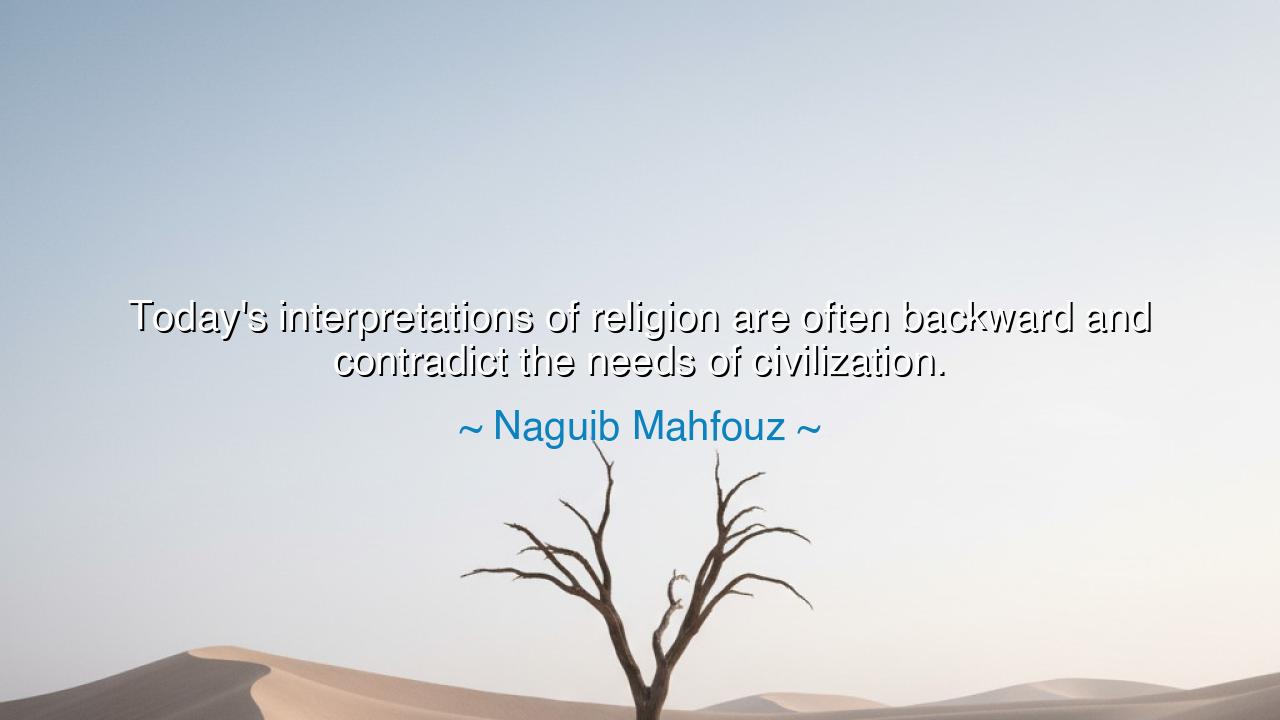
Today's interpretations of religion are often backward and
Today's interpretations of religion are often backward and contradict the needs of civilization.






The words of Naguib Mahfouz—“Today’s interpretations of religion are often backward and contradict the needs of civilization.”—sound like a cry of both sorrow and warning. They speak of the tension between the eternal truths that faith is meant to carry and the distorted forms that men often impose upon it. Mahfouz, a Nobel laureate who gazed deeply into the soul of Egypt and the wider Arab world, saw clearly that when religion is interpreted without wisdom, it can cease to be a guiding light and instead become a stumbling stone in the path of progress. His words strike at the heart of a dilemma that has echoed through every age: the conflict between tradition misused and the ever-rising needs of civilization.
The origin of this reflection lies in Mahfouz’s lifelong meditation on faith, reason, and society. Living in a world where religious discourse often clashed with modernity, he observed how sacred teachings were sometimes twisted by the hands of men to defend ignorance, repression, or violence. In his novels, he explored this tension with nuance: the eternal yearning for God on one hand, and the tragic misuse of religious authority on the other. His warning is timeless—when religion is interpreted as a chain that binds rather than as a lantern that guides, it contradicts the flourishing of human life.
History offers many examples of this danger. Consider the Galileo affair in the seventeenth century. Galileo looked through his telescope and discovered truths about the heavens that contradicted old interpretations of scripture. Instead of embracing discovery, religious leaders of his day condemned him, fearing that science threatened their power. In that moment, the interpretation of religion was indeed backward, resisting knowledge rather than harmonizing with it. Civilization cried out for truth, yet interpretation chose fear. Mahfouz’s warning rings clearly here: when interpretation hinders progress, it betrays the divine.
Yet history also shows us the opposite: times when faith and progress walked hand in hand. During the Islamic Golden Age, scholars such as Avicenna and Averroes drew upon both reason and revelation, producing advances in medicine, philosophy, and mathematics that shaped the world. Here, religion was interpreted not as a prison but as a foundation, a call to seek knowledge as a form of devotion. In this harmony between faith and civilization, humanity flourished. Mahfouz’s lament is not against religion itself, but against those readings of it that betray its higher spirit.
The heart of his words lies in the recognition that civilization is ever-changing, ever-growing, and ever in need of wisdom that liberates rather than shackles. To hold rigidly to interpretations that ignore justice, equality, and reason is to drag civilization backward, to deny humanity the progress it longs for. Religion at its noblest should uplift, inspire, and strengthen, not degrade, divide, or restrain. When it fails this test, it ceases to serve as a beacon and becomes instead a relic of oppression.
The lesson is plain: we must distinguish between the eternal and the temporary, between the essence of faith and the flawed interpretations of men. Let us not confuse the pure water of divine wisdom with the muddy vessels that sometimes carry it. Our task is to keep returning to the heart of religion—compassion, justice, truth—and ensure that these values align with the needs of our time. Only then will faith and civilization march together toward higher ground.
Practically, this means cultivating humility and discernment. Do not accept every voice that claims authority in the name of religion, but weigh it against the timeless call to mercy and justice. Encourage dialogue between faith and knowledge, between tradition and progress. Support leaders, teachers, and communities who interpret religion as a force for peace and growth, not for division and regression.
Thus Mahfouz’s words endure as both warning and hope. Interpretations of religion that are backward will always exist, but so too will the eternal call for faith to shine as a partner of human progress. Let us then be guardians of this balance, ensuring that the wisdom of the ages fuels the needs of the present, and that religion remains not a chain of fear, but a living flame guiding humanity ever forward.






AAdministratorAdministrator
Welcome, honored guests. Please leave a comment, we will respond soon